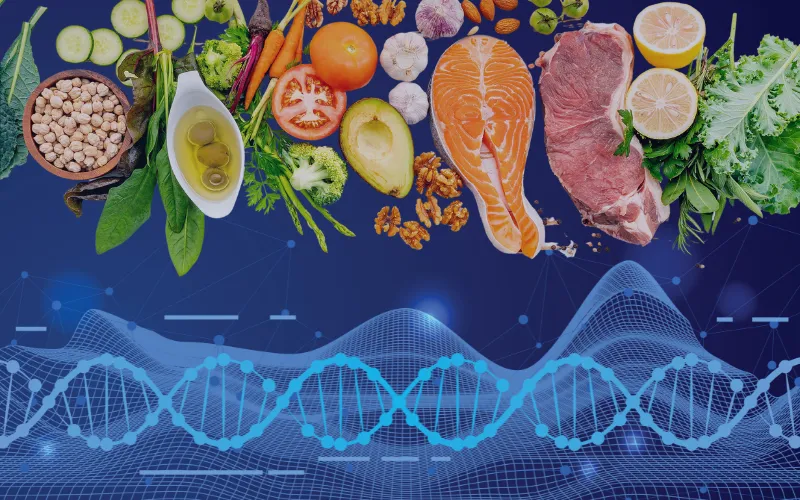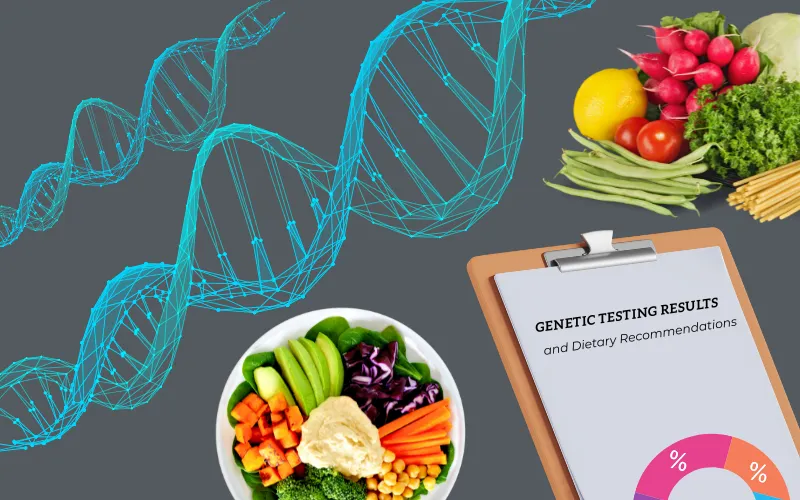
What if the secret to your optimal health isn’t found in the latest diet trend but written directly in your DNA? Millions follow generic diet plans, but is it possible to have dietary interventions based on genetics? Nutrigenomics is changing how we approach diet and disease prevention. Your genes affect how you process nutrients and vitamins, influencing nutrient and vitamin metabolism. This personalized approach is especially promising for managing conditions like diabetes, obesity, and heart disease.
Your genes act like recipes, and nutrients are the ingredients. Understanding nutrient-gene interactions helps create the perfect diet uniquely suited to you. This genetic insight explains why some diets work for certain people but fail for others.
Key Takeaways
Nutrigenomics focuses on how diet and genetics interact, such as SNPs in FTO gene, enabling tailored nutritional plans that align with your genetic blueprint for optimized health.
Genetic variations, such as SNPs, significantly influence individual responses to nutrients, explaining why some diets work better for certain people.
Advanced technologies like genomics, metabolomics, and epigenomics are vital for understanding how food choices affect gene activity and overall health.
Personalized dietary interventions promote better disease prevention and management, such as improved insulin sensitivity or reduced cardiovascular risks.
Common genetic conditions, like celiac disease or Phenylketonuria (PKU), benefit greatly from targeted diet adjustments informed by genetic insights.
Nutrigenetic testing and professional guidance are essential for interpreting DNA-based nutritional data to create effective, custom-tailored diet plans.
Table of Contents
The Science Behind Nutrigenomics
It might sound like science fiction, but nutrigenomics blends your diet and DNA to optimize health in ways that traditional nutrition has not understood. Think of your genes as the instruction manual for your body, and nutrients as the tools that help carry out those instructions. Let’s jump into how this relationship works.
How Genes Interact with Diet: Foundations of Genetic Nutrition
Your genes and diet are constantly chatting—figuratively speaking, of course. Nutrigenomics studies how what you eat can flip genetic “switches” on or off, influencing how proteins and chemicals are made in your body. This affects everything from how you metabolize carbs to whether you’re more prone to heart condition.
Single nucleotide polymorphisms (or SNPs, the “typos” in your DNA) make up about 90% of your genetic variations*. They’re why one person might thrive on a keto diet while another feels sluggish. Take the MTHFR gene variant (C677T), for example. It throws a wrench in folate metabolism, bumping up homocysteine levels—a risk factor for cardiovascular condition. Knowing this, you can adjust with folic acid supplements to dodge trouble before it even starts[1].
And it’s not just folate—nutrients like choline and vitamins B2, B6, and B12 also quietly influence your genes, especially through metabolic processes like the one-carbon cycle. It’s wild when you think about it: your breakfast is literally rewriting parts of your biology.
Leveraging Omics Technologies for Dietary Interventions Based on Genetics
Genomics, once a topic only for scientists, is now unpacking how diet and genetics are connected, thanks to advancements in omics technology.
Genomics focuses on your DNA blueprint, while transcriptomics checks which genes are getting “turned on.” For instance, after indulging in that high-carb pasta dish, transcriptomics might reveal how your insulin-related genes react. Metabolomics tracks metabolites, the chemical fingerprints showing how your body processes nutrients. Epigenomics looks at how your food can tweak DNA activity without ever changing the code. Imagine your genes as an orchestra, and epigenomics is the conductor ensuring every section plays in harmony (or not, if your diet is way off-balance).
Here’s a real-world example: a high glycemic index diet and Adiponectin gene polymorphisms can worsen insulin resistance. Omics tools help pinpoint such interactions, making them important for crafting truly personalized diets.
Genetic Conditions and Personalized Dietary Interventions
When you pair specific diets with common genetic conditions, the results can be life-changing. It’s proof that nutrition and genetic interventions are more than theory—they’re practical solutions for better health.
Certain health conditions require dietary changes based on genetics: People with Phenylketonuria (PKU) follow a low-phenylalanine diet to avoid neurological damage. Those with celiac disease tied to HLA gene mutations need a gluten-free diet to prevent gut issues. Meanwhile, individuals with lactase persistence (LCT gene variation) can manage lactose intolerance with lactase supplements or reduced lactose intake. These personalized diets highlight the value of understanding your genetic makeup for better health.

Top Benefits of Dietary Interventions Based on Genetics
Gene-based diet changes can transform your nutrition by aligning what you eat with your unique genetic blueprint, revealing a personalized path to better health and more vibrant living.
Personalized Health Optimization
Your diet isn’t just healthy—it’s made just for you. Dietary interventions based on genetics dial into what your body truly needs, leading to benefits you can feel. For example, a Dutch study found that personalized nutrition advice reduced body fat percentage in older adults. Clinical trials have also shown people are more likely to stick to diets tailored to their specific genes compared to those following generic guidelines. Why? Because these diets fit you like a custom-made glove.
Better yet, it’s not just about weight management. These nutrition plans can enhance how your body absorbs and metabolizes nutrients, which means less guesswork and more results. They’ve also proven to lower risks of chronic conditions like type-2 diabetes and cardiovascular diseases. And let’s be honest: sticking to a meal plan that feels tailored to your health quirks is way easier than choking down yet another one-size-fits-all diet.
Chronic Disease Management Through Gene-Based Diets
Did you know non-communicable diseases are behind 71% of global deaths each year?** That’s staggering—but here’s the good news: Nutrigenomics offers you the tools to fight back with precision.
Take obesity, for example. If your genetic report reveals variants like APOE—linked to how your body handles fats—you’ll know to adjust your fat intake accordingly. Or let’s say you’re concerned about cardiovascular health. Nutritional interventions using foods rich omega-3 fatty acids might help regulate genes like APOA1 to reduce plaque buildup in arteries. And for type-2 diabetes, personalized plans guided by genetic markers can improve insulin sensitivity and keep blood sugar in check. It’s like you’re outsmarting chronic illness.
Myths About Dietary Interventions Based on Genetics
There are a lot of misconceptions when it comes to genetic-based diets. First up: the idea that everyone responds to the same diet in the same way, but that’s just flat-out wrong. Your genes control how you digest, absorb, and metabolize foods, so your cousin’s keto success could be your carb-crash nightmare (not fair, but true).
Another one is that nutrigenomics is a fully mature science, ready to solve every health mystery. Don’t get it wrong, it’s groundbreaking—but it’s still evolving. While we’ve made massive strides, there’s still a lot of research to work out before everyone’s carrying their own genetic nutrition handbook.
How Nutrigenomics Works in Real Life
When it comes to nutrigenomics, the phrase “you are what you eat“ takes on a whole new meaning. Imagine if your DNA could guide what you add to your plate—boosting energy, improving gut health, or even helping you sidestep chronic conditions. Let’s jump into how this plays out in real life.
Nutrigenetic Testing: What to Expect
Think of nutrigenetic testing as a behind-the-scenes look at how your body processes what you consume. The process starts with a simple saliva or blood sample (no, it’s not as scary as it sounds!). Laboratories analyze your DNA for specific genes, like CYP1A2, which impacts your caffeine metabolism, so you’ll finally know if that late-night espresso is your friend or foe. Other markers, like GSTT1, can reveal your body’s efficiency in metabolizing antioxidants like vitamin C.
You’re not just handed a pile of unreadable data either. Once your results are ready, you’ll receive curated dietary recommendations. For example, a 2014 study showed that people who tweaked their sugar, caffeine, or sodium intake based on genetic advice were more successful in improving their habits than those who didn’t. So yes, avoiding that sprinkling of salt on your fries might just be written in your genes.

Steps to Launch Your Own Gene-Based Nutrition Plan
Ready to make your DNA work for you? Here’s how:
Consult a Professional
First stop: work with a genomics practitioner. They’ll help you wade through the complexities so you’re not left scratching your head over scientific jargon.
Undergo Testing
Choose a reputable nutrigenetic testing service—one recognized in clinical settings or a trusted direct-to-consumer option if you want quick results.
Interpret Results
Decoding your test results is critical. A professional will help you understand facts like, “You need more folate,” versus blanket advice that might not fit your genetic profile. For instance, if your results flag an MTHFR variant, you might need to pump up your intake of dark leafy greens.
Follow Tailored Plans
Work recommended food into your diet and remove offenders based on what is flagged—small but effective swaps are a good starting point.
Monitor Progress
Let data lead the way. Track your body’s response through blood markers like cholesterol levels or glucose tolerance and reassess your plan if you see changes that are not optimal or you have new health goals.
Top Tools and Tech for Implementing Dietary Interventions Based on Genetics
Technology is your secret weapon here, bridging science with everyday nutrition. Microarrays and RNA-Seq might sound like lab jargon, but they’re how experts identify which nutrients make your genes light up like a Christmas tree. Metabolomic profiling goes a step further, revealing how specific diets affect your body over time—think of it as tracking the ripple effects of your meals.
Some nutrigenomic testing methods are carried out with direct-to-consumer (DTC) tests, bringing this science home. While offerings like these aren’t as tightly regulated as clinical testing, they’re an accessible starting point for curious minds. Pair these with apps or wearable tech that help you track diet and activity for real-time feedback, taking your personalized nutrition game to the next level. With these tools and approaches, you’ll not only understand the “why” behind your diet but also get actionable steps to make those gene-based diet changes stick.
Avoid These Common Mistakes in Gene-Based Nutrition
Even with the rising excitement around nutrigenomics, there are a few hiccups you might stumble upon when trying to carry out these concepts in your practice. Let’s clear up some common missteps so you can confidently guide your patients toward effective, genetically informed dietary interventions.
Blind Spots in Nutrigenomics Adoption
Assuming nutrigenomic advice is one-size-fits-all.
Thinking that every individual will benefit equally from a gene-based diet is like believing everyone looks good in the same outfit—some things just don’t fit! Chronic conditions such as obesity, diabetes, and heart condition are influenced by a mix of genetic, environmental, lifestyle, and even microbiome factors. To avoid this, focus on integrating multiple insights, like analyzing gut health or considering stress levels, alongside genetic information. This more holistic approach ensures you’re not oversimplifying something as complex as health.
Skipping professional interpretation.
Diving into genetic test results without consulting trained professionals is akin to assembling furniture without instructions—it’s messy, confusing, and usually ends in frustration. Not all practitioners are comfortable with genetic data, so you’ll want to lean on dietitians or genetic counselors skilled in nutrigenomics. They can translate those dense reports into practical recommendations—minus the head-scratching!
Over-relying on direct-to-consumer (DTC) tests.
While DTC testing (the kits that claim to decode your DNA at home) is an excellent starting point, it’s not the whole story. Using them as your sole guide can lead to oversights or, worse, missteps in care. Instead, think of these tests as a first step to spark the conversation with patients. From there, dive deeper, monitor progress, and adjust recommendations based on real-world health outcomes. Remember, no test can see the big picture quite like a practitioner armed with experience and context.
Under-Discussed Topics
Why the Microbiome Still Matters in Genetic-Based Diet Planning.
Your gut isn’t just a place to digest tacos—it’s a bustling metropolis of bacteria that holds significant sway over how your body interprets genes. Unfortunately, this often gets brushed aside in favor of focusing solely on DNA. For example, personalized diets factoring in microbiome metrics have been shown to improve blood sugar control in ways traditional generic diets can’t touch[2]. Don’t let this hidden powerhouse slide by unnoticed in your recommendations.
Phenotyping: The Overlooked Layer in Personalized Nutrition.
Sticking to static genetic biomarkers alone without addressing how a patient reacts in real-time? That’s like judging a marathon runner based solely on their shoes and ignoring their performance on the track. Emerging practices like dynamic phenotyping—think glucose tolerance tests or tracking post-meal responses—capture the bigger health story. Pairing this with genetic insights gives you practical, actionable data that tweaks the plan to how their body actually behaves.
Final Thoughts: Making Dietary Interventions Based on Genetics Work for You
Embracing the connection between your genetics and diet opens up a world of possibilities for improving your health. By tailoring your nutrition to your unique genetic makeup, you can make smarter choices that align with your body’s specific needs.
Nutrigenomics isn’t just about preventing condition—it’s about empowering you to take control of your well-being with insights rooted in science. With the right tools, professional guidance, and a commitment to understanding your DNA, you can unlock a healthier, more personalized approach to nutrition. If you’re ready to unlock the power of personalized nutrition with dietary interventions based on genetics, consider our Integrative Genomics Specialist Program. This program equips you with the knowledge to decode the genetic foundations of health, pinpoint critical genetic factors affecting well-being, and implement innovative, tailored strategies for optimal health outcomes. Elite Gene Labs is here to empower you every step of the way.
Frequently Asked Questions
What are dietary interventions based on genetics?
Dietary interventions based on genetics use information about your genes (like SNPs in FTO or MTHFR) to tailor nutrition plans. This approach helps predict how you may process fats, carbs, or nutrients, offering a personalized way to improve metabolism, nutrient absorption, and reduce disease risk.
Can a DNA-based diet help me lose weight?
At this time, clinical studies like POINTS (2023) and DIETFITS (2018) show no significant advantage in weight loss when following diets aligned with one’s genetics compared to mismatched plans. Lifestyle factors like calorie intake, exercise, sleep, and microbiome still play a greater role.
Is genetic testing reliable for creating personalized diets?
Genetic testing can be informative—but most direct‑to‑consumer tests are limited. For complex conditions like obesity or diabetes, genetics is only one piece of the puzzle. Professional interpretation alongside health history, labs, and lifestyle factors is essential.
What are the benefits of genetically tailored diets?
Properly applied, they can improve nutrient absorption, help regulate metabolism, reduce risk factors (e.g. high triglycerides), and enhance motivation for healthy habits. They may also identify risks for conditions like high blood pressure or lipid disorders.
What are the limitations and risks of nutrigenomics-based diets?
Limitations include ethical concerns (data privacy), limited scientific validation for many SNP‑diet links, risks of over‑medicalizing food choices, and the possibility of misinterpreting gene expression as fixed traits. Evidence remains sparse and evolving.
Who might benefit most from genetic‑based dietary guidance?
Those with known single‑gene metabolic conditions like phenylketonuria (PKU) benefit from dietary intervention based on their genetic status. Others with polygenic risks may gain insights, but must combine genetics with professional assessment for the best outcomes.
How should I interpret results from genetic diet tests?
Use them as guidance—not prescription. Consider your test results alongside family history, blood markers, diet, activity, and lifestyle. A registered dietitian or clinician trained in nutrigenomics should help you translate findings into safe and balanced dietary choices.
Why are genetics alone insufficient to design the perfect diet?
Gene expression is influenced by epigenetics, environment, gut microbiome, sleep, stress, and physical activity. Many gene variants offer little predictive power unless these factors are accounted for. That’s why single‑factor genetic diets often underdeliver.
What should I ask when considering genetic-based dietary services?
Ask whether the provider offers support from qualified professionals (e.g. dietitians), what genes they analyze, how strong the evidence is, what lifestyle data they consider, and how privacy/confidentiality of genetic data is managed.
References:
*Sherry, S. T., Ward, M., & Sirotkin, K. (1999). dbSNP—Database for single nucleotide polymorphisms and other classes of minor genetic variation. Genome Research, 9(8), 677–679. https://genome.cshlp.org/content/9/8/677.full
- **World Health Organization. (2023). Noncommunicable diseases: Key facts. https://www.who.int/news-room/fact-sheets/detail/noncommunicable-diseases
- [1] Moll, S., & Varga, E. A. (2015). Homocysteine and MTHFR mutations. Circulation, 132(1), e6–e9. https://www.ahajournals.org/doi/full/10.1161/CIRCULATIONAHA.114.013243
Celis-Morales, C., et al. (2017). Effect of personalized nutrition on health-related behaviour change: Evidence from the Food4Me European randomized controlled trial. International Journal of Epidemiology, 46(2), 578–588. https://academic.oup.com/ije/article/46/2/578/2612406
Nielsen, D. E., & El-Sohemy, A. (2014). Disclosure of genetic information and change in dietary intake: A randomized controlled trial. PLoS ONE, 9(11), e112665. https://journals.plos.org/plosone/article?id=10.1371/journal.pone.0112665
[2]Zeevi, D., et al. (2015). Personalized nutrition by prediction of glycemic responses. Cell, 163(5), 1079–1094. https://www.cell.com/cell/fulltext/S0092-8674(15)01393-8

